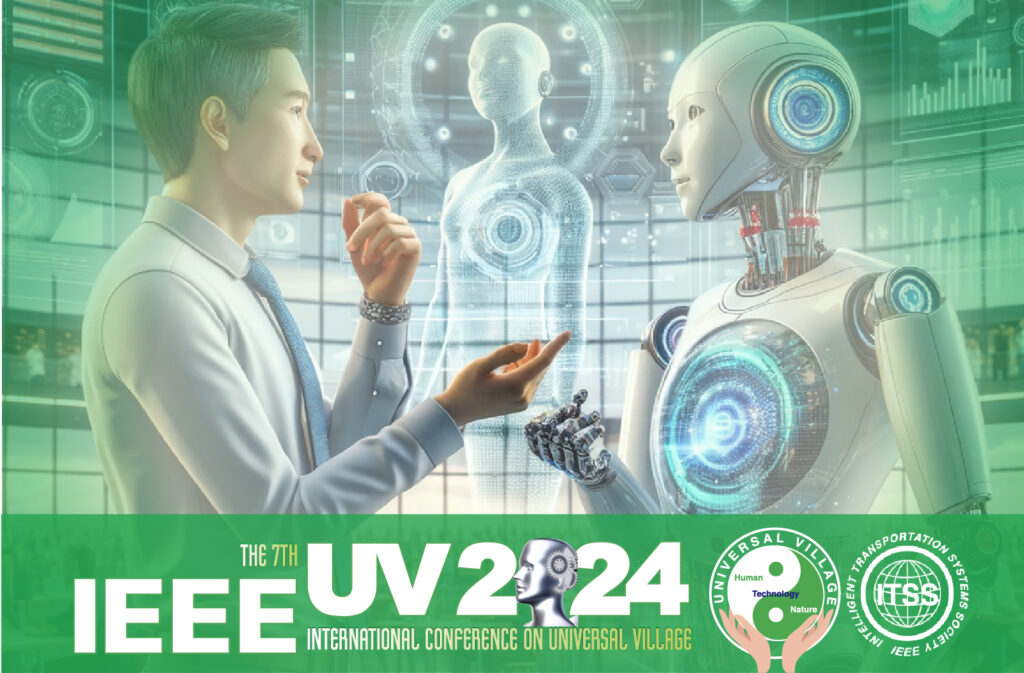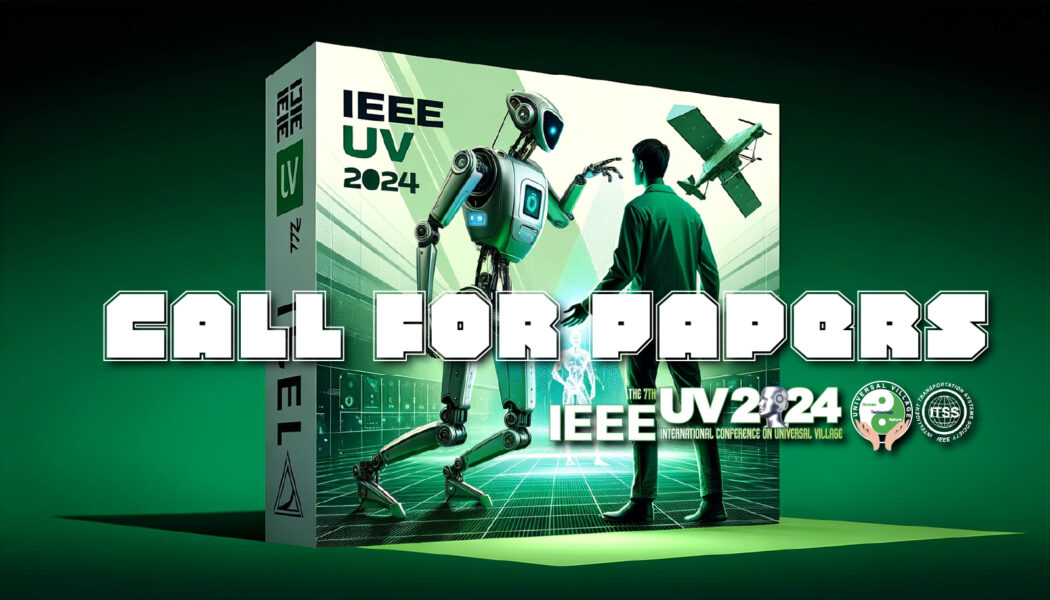We are pleased to announce that the 7th IEEE International Conference on Universal Village (IEEE UV2024) will be held virtually and locally, from October 19-22, 2024.
We warmly invite you to join our IEEE UV2024 conference! Accepted papers will be submitted for inclusion into IEEE Xplore subject to meeting IEEE Xplore’s scope and quality requirements. We greatly appreciate your leadership and contributions to UV!
- Universal Village (UV) is a new concept proposed by MIT’s Universal Village Program in 2012. Universal Village (UV) exemplifies an ideal future society that pursues harmony between humans and nature through the wise use of technology.
- The IEEE UV Conferences call for collective efforts from world-renowned experts across multi-disciplinary fields to collaborate beyond traditional field boundaries. Previous IEEE UV conferences (UV2013, UV2014, UV2016, UV2018, UV2020 and UV2022) were groundbreaking international venues that inspired successful collaboration among governments, academia, industries, and civil society.
- IEEE UV2024 features the theme of “Reflections on the Human-AI Relationship and AI-Pervasive Societal Transformation: Human-centricity, Explainable AI, and Intent & Behavior Understanding for Integration, Resilience, Inclusiveness, and Sustainability.”
- Specifically, IEEE UV2024 features the following topics:
-
- Developing systematic methodologies to advance UV technologies and to develop UV systems, including Intelligent Transportation Systems, Urban Planning and Crowd Management, Smart Infrastructure, Smart Response Systems for Emergencies, Smart Energy Management, Smart Environmental Protection, Smart Home and Community, Smart Medicine and Healthcare, and Smart Humanity
- New lifestyles enabled by IT / New Energy / New materials / Effective microorganism technology and environmental protection
- Exploring UV development paths that are appropriate for different regions at different development phases, from theoretical exploration, research development, framework design, implementation, engineering, to integration
- Inspiring successful collaboration among governments, academia, industries, and civil society to address different UV challenges and seek practical UV solutions
-
- IEEE UV2024 will hold sessions for scientists, students, engineers, entrepreneurs and government representatives to share their perspectives on various research areas.
Technical Session Details
- [TS1-A] Vision for Universal Village
- Vision for Universal Village: Cities’ Smartness, Efficiency, Safety, Environmental Qualities, and Inclusiveness
- [TS1-B] Development Status of Universal Village
- Development status of current smart cities in different countries
- Discussion of limitations and challenges
- [TS1-C] UV Indices, UV Incentive Mechanisms, and Evaluation of UV Subsystems – Methods, Technologies, and Systems
- UV Indices: Quantitative Indications of Cities’ Smartness, Efficiency, Safety, Environmental Qualities, and Inclusiveness
- Incentive Mechanisms for the Development of UV-Oriented Systems
- Evaluation of current methods and technologies for UV subsystems
- Smart Home and Community
- Smart Medicine and Healthcare
- Intelligent Transportation, Urban Planning, and Crowd Management
- Smart Energy Management
- Smart City Infrastructure
- Smart Response Systems for City Emergencies
- Smart Environmental Protection
- Smart Humanity
- Analysis of impact factors for different UV subsystems
- Information flow
- Material cycle
- Lifestyle: issues such as food waste
- Community
- Subsystem coordination and interaction analysis: Analysis of the mutual interactions among UV subsystems and evaluation of the system coordination
Seeking integrated, resilient, human-centered, sustainable and environment-friendly solutions under the concept of Universal Village
-
[TS2-A] Systematic and Integrated Frameworks for UV Subsystems and Contributing Factors
-
[TS2-B] Intelligent Modeling, Simulation, and System Analysis
- [TS3-A] Intelligent Transportation, Urban Planning, and Smart City Infrastructure
- Interconnected transportation systems; intelligent road transportation management; safety enhancement based on the interaction among passengers, vehicles, event planners, and other stakeholders
- Coordinated traffic control; smart parking; urban planning
- Smart logistics and distribution services; last-mile delivery
- Smart facilities; smart construction; smart lighting/heating/cooling/ventilation systems; smart sewerage and sanitation systems; smart water and waste management
- Coordinated city infrastructure development and operational management; smart infrastructure lifecycle management; predictive analytics for identifying infrastructure vulnerability
- [TS3-B] Intelligence Vehicles, Mobility Support for Vulnerable Groups
- Autonomous vehicles; drones; intelligent electrified vehicles; smart wheelchairs; robotic exoskeletons for vulnerable groups
- Intelligent driving assistance systems; navigation and localization systems; vehicle hardware/software systems; vehicle on-board diagnostics; vehicular signal processing; smart cockpits
- Human-oriented sensing and recognition for vulnerable road users and animals; intercommunication among passengers, vehicles, and traffic lights
- Connected vehicles; vehicle dynamics and control
- Human factors; cognition and control; driver monitoring
- Policies and regulations for intelligent vehicles
- [TS3-C] Crowd Management, Smart Response Systems for City Emergencies
- System vulnerabilities identification; crisis prevention and city robustness reinforcement; crowd management
- Emergency (natural disasters, crimes, accidents, etc.) prediction, detection and management; cyber-security; smart alerting and hierarchical information collection and distribution; active disaster response and recovery
- [TS3-D] Information Flow, Communication, Networks, and Security
- Smart data acquisition; mobile sensing; crowdsourcing; the Internet of Things; seamless wireless networks; information and communication technology (ICT) infrastructure
- Information integration; information storage, sharing, circulation, and visualization; cloud service; blockchain; data repository
- Solutions for security, safety, reliability and privacy issues
- [TS4-A] Renewable Energy and Smart Energy Management
- Renewable energy capture and conversion, emerging technologies
- Solar energy: photovoltaics, solar thermos
- Wind energy: wind turbine materials and novel designs
- Hydrogen energy: solar splitting water, fuel cells
- Other energies: biomass, renewable natural gas, hydroelectric energy, blue energy
- Energy storage devices and technologies (batteries, supercapacitors, and fuel cells)
- Smart grids; transmission infrastructure; integrated energy management for high efficiency and zero-emission; theoretical simulations of renewable energy and its applications; smart meters; demand response management (DRM)
- Resilient operations against disturbances, unexpected errors, accidents, physical and cyber-attacks, and natural disasters
- Renewable energy capture and conversion, emerging technologies
- [TS4-B] Smart Materials and Devices
- Smart materials for advanced electronic devices (sensors, actuators, transducers)
- Smart materials for energy conversion (piezoelectric, magneto-elastic, thermoelectric, electrostriction)
- Advanced intelligent devices and systems
- Artificial Intelligence (AI) for materials development
- Smart Manufacturing
- Cloud manufacturing
- Cloud-edge collaboration in manufacturing
- Additive manufacturing and robotics
- Planning and scheduling of manufacturing tasks
- Quality detection and control
- Large Language Models (LLMs) for manufacturing
- Computer vision and other AI technologies in manufacturing
- Smart Agriculture
- Vertical farming; smart crop/soil/pest management; precision irrigation; smart livestock farming; climate-smart agriculture
- Unmanned aerial vehicles (UAV), robotics, and automated machinery for agriculture
- Smart sensing and monitoring, Internet of Thing, big data analysis, predictive analytics (crop/disease/weather) and decision-making in agriculture
- [TS7-A] Smart Environmental Protection; Smart Ecological Systems
- Environmental protection: exhaust/wastewater/solid waste management; pollution control (air/water/soil; light/noise/radiation); effective microorganism technology; green roofs
- Challenges and solutions for climate change; restoration and protection of ecosystems; ecological economics and strategies; ecological informatics and acoustics
- [TS7-B] Mobility-enabled Material Cycles; the Circular Economy; Trash and Scrap Collection, Processing, Reuse, and Recycling
- Smart trash cans and their optimal placement; smart garbage trucks
- Smart recycling; smart residential trash and industrial scrap collection and transportation; circular economy; material reuse; second-hand markets;
- Cultural and economic factors; development of innovative lifestyles, public awareness and community engagement
- Crowdsourcing, data collection, and visualization for material cycles
- Material cycles optimization: smart waste management; smart trash and scrap processing, reuse and recycling; smart platform development for coordinated information sharing among smart recycling, user feedback on products and smart manufacturing
- [TS8-A] Smart Homes and Community, Virtual Living
- Smart appliances and devices; smart windows; intelligent deformation furniture; smart inventory management; smart home OS
- Safety and security; self-adaptive home-emergency response systems
- Smart life; fashion AI; home gardening and agriculture
- Intelligent support for vulnerable groups; homeless care; domestic violence protection
- Community support and virtual living during pandemic and other city emergencies
- [TS8-B] Mobility, Connectivity, and Innovative Lifestyles
- Integrated and technology-driven solutions to improve the quality of life: quantified self-devices and self-tracking technologies; smart textiles; VR/AR-based sports, entertainment and other activities; human-centered transportation, smart mobility and seamless transit systems; smart agents and human-computer interaction
- New lifestyles to reduce energy consumption and emissions: shared mobility and other new lifestyles made possible by the sharing economy; virtual tours; work from home; electronic surveillance
- Changing trends in cultures/technologies/lifestyles
- [TS9-A] AI Assisted Healthcare Monitoring
- AI for healthcare data acquisition, processing, and analysis
- Machine learning algorithms for ultrasound/MRI/CT imaging analysis
- AI for healthcare data security and privacy considerations
- [TS9-B] Smart Medicine and Smart Healthcare
- Healthcare system integration and interoperability; AI for healthcare logistics; Internet of Medical Things (IoMT); AI-powered hospital triage platform; robotics and automation in healthcare
- AI for medical diagnostics and screening; predictive modeling; telemedicine and virtual consultations; personalized medicine; 3D printing in medicine; wearable devices; pervasive and non-invasive health-monitoring
- Intelligent nursery and senior care; assistive technologies for vulnerable groups; virtual care and mobile health
- Personalized healthcare and wellness management; smart diet and exercise; mental health; integrated medicine
- [TS9-C] Public Health, Epidemic Prevention and Control
- Alternative medicine; somatic science; community/rural/urban health; palliative care and hospice care; epidemic control and personal hygiene; equity and ethical issues
- Epidemic prediction and contact tracking
- Coordinated operational management across all levels during emergencies; smart resource allocation; quarantine and isolation; smart medical waste processing
- Crowdsourcing, data collection, and visualization
- [TS10-A] Urbanization and Smart Communities
- Urbanization: impact and challenges; geographical, cultural, and political factors
- Smart communities and neighborhoods; social media and support groups; community resource management; supporting infrastructure; data platforms and community clouds
- [TS10-B] Smart Government and Social Services
- Smart government: smart administration, regulation, policy and law; participatory governance; smart resource allocation
- Smart social services and social networks; smart education/training; civic engagement
- [TS10-C] Integrated Solutions for Smart Humanity
- New legal, social, and ethical challenges posed by applications of AI; integrated solutions: quantified analysis for the safety and ethics of intelligent systems; the social responsibility of enterprises; establishing legal, regulatory and ethical frameworks for development of AI
- Integrated solutions to promote diversity, inclusiveness, fairness, and the preservation of cultural heritage
- Ecological/environmental/humanistic/organizational psychology; persuasive technology
- Adaptive development strategies for various geographic regions at different developmental phases and people of different ages with diverse technology and cultural backgrounds
- [TS10-D] Smart Design and Design Ethics
- Evaluation of smart designs and their unintended consequences; emergent technologies for smart designs, simulation platform, and system optimization
- Interaction between different smart systems; impact of smart design on lifestyles, communities, and the environment; major challenges and impact factors of smart system design
- Coordinated design under the principles of usability, enjoyability, sustainability, inclusiveness, and cultural preservation; design ethics in the AI era
- Intelligent electromechanical design; Intelligent industrial design; Intelligent environmental design; Intelligent architectural and infrastructure design; Intelligent agent design; digital design; digital media art; visual media design; new media design; animation design; information and communication platform design; virtual environment design; design of logistics, crisis response, cities services and applications; multidisciplinary design
- [TS11-A] Responsible and Ethical Data Management and Processing
- Data cleaning; data fusion and integration; data quality and integrity; data visualization; data mining; big data analytics
- Human-centered/cognitive/mobile/cloud computing
- Urban informatics; data-driven monitoring, analysis, prediction, planning and decision making; real-time big data services; smart city control centers; application benchmarking and city indices; knowledge management (KM)
- [TS11-B] Learning Algorithm Development, Analysis and Interpretability
- Signal processing and understanding (image/video/audio/speech/natural language); semantics interpretation; multimodal sensor fusion and city monitoring; diagnostic algorithms
- AI, machine learning and interpretability; fairness, accountability, privacy, transparency, and, ethics; deep-fake detection
- Intelligent modeling, simulation, prediction and optimization; system dynamics; system control
- [TS12-A] Advances in Distributed Energy Systems: Design,Simulation and Operation
- [TS12-B] Universal Village: Go Underground
- [TS12-C] The Fusion of Traditional Chinese Medicine and Modern Science
- [TS12-D] AI-Driven Sports Training, Exercise, and Fitness
- [TS12-E] Equitable AI for the Voiceless and Vulnerable Groups
UV Forums Details
- [CF] UV City Forum
- Reflections on urbanization and its unintended consequences
- Current development status and challenges of smart cities; vision of future UV development
- Collaboration among governments, academia, industries, and civil society
- [SF] UV Student Forum
- UV student research, innovations, and discussions
- UV philosophy and story sharing, technology news, social hot topics, and vision
- Preserving cultural heritage in the process of urbanization
- Bridging the generation gap and promoting understanding across diverse groups with the aid of UV technologies
- Exploring future lifestyles for sustainable happiness
- UV introduction video, talent shows and online games
- UV entrepreneurship initiative and pitch competition
- Future development of UV club and UV student forum
- [AF] UV Art Forum
- Digital arts; Non-fungible tokens (NFTs); AI / VR / AR-enabled artifacts
- Comfort art in the post-pandemic era
UV Competition Details
Solving problems in the real world and encouraging innovations from the young generation; finding a new way of life in the post-pandemic world
- [DSC] UV Data Science Competition
- Machine Learning Challenges
- Computer Vision Challenges
- [MC] UV Modeling Competition
- [PC] UV Pitch Competition
- Reflections on urbanization and its unintended consequences
- Current development status and challenges of smart cities; vision of UV development
- Collaboration among governments, academia, industries, and civil society
- [K12C] UV K-12 Challenge
- Innovation Competition
- Research Presentation
- Talent Shows
- Online Game
Panelists are welcome!
Session Chairs are welcome!
Sponsors are welcome!
Reviewers are welcome!

The final deadline for paper submissions has been extended to October 5, 2024.
The deadline for abstract submission to Student Forum has been extended to October 10 2024, to allow for a later paper submission.
- Authors must submit SHORT PAPERS (3-4 pages) or REGULAR PAPERS (5-8 pages) electronically as single PDF files in US Letter size (not A4).
- Authors must use the IEEE conference template, a two-column template, as shown in the links below:
-
- Microsoft Word format: https://www.ieee.org/content/dam/ieee-org/ieee/web/org/conferences/conference-template-letter.docx
- LaTeX format: https://www.ieee.org/content/dam/ieee-org/ieee/web/org/pubs/conference-latex-template_10-17-19.zip
- LaTeX Instructions: http://www.ctan.org/tex-archive/macros/latex/contrib/IEEEtran/IEEEtran_HOWTO.pdf
-
- Please follow the IEEE standards and ensure that all fonts are embedded. Please also remove running headers/footers, page numbering, and blue underlining for URLs and email addresses. Detailed Guidelines: https://standards.ieee.org/content/dam/ieee-standards/standards/web/documents/other/embeddedfonts.pdf
- Please be prepared to submit a paper abstract (100-300 words) when submitting a paper.
| Paper submissions deadline | October 05, 2024 |
| Notification of paper acceptance | October 10, 2024 |
| Final manuscripts due | October 15, 2024 |
INSTRUCTIONS FOR FORUM and COMPETITION SUBMISSIONS
[CF][SF][AF] [DSC][MC][PC][K12C]:
All applicants of Forum and Competition sessions must submit a one-page abstract (100-300 words) and five-to-twenty-page presentation PowerPoint/PDF slides.
All applicants of the Data Science Competition and the Modeling Competition must also submit their papers and other supporting documents (e.g. codes and video clips) to showcase their results.
Authors of accepted submissions (or at least one of the authors) are expected to register for IEEE UV2024 and to present their work at IEEE UV2024.
Papers in Competition sessions that have been accepted and presented at IEEE UV2024 will be published in the conference proceedings and be submitted for inclusion into IEEE Xplore subject to meeting IEEE Xplore’s scope and quality requirements.
.
IMPORTANT DATES FOR FORUM and COMPETITION SESSIONS:
| Abstracts and presentation slides submission deadline | October 05, 2024 |
| Notification of acceptance | October 10, 2024 |
| Final manuscripts due | October 15, 2024 |
IMPORTANT DATES AT A GLANCE
| Submission system open | February 15, 2024 |
| Full-length paper/poster submissions due | October 05, 2024 |
| Notification of full-length paper/PPT acceptance | October 10, 2024 |
| Final manuscripts due | October 15, 2024 |

IEEE UV2024 ORGANIZING COMMITTEE
One Broadway, Cambridge, MA 02142, USA
Email: <uv2024.conf@universal-village.org>
Website: www.UniversalVillage.org



